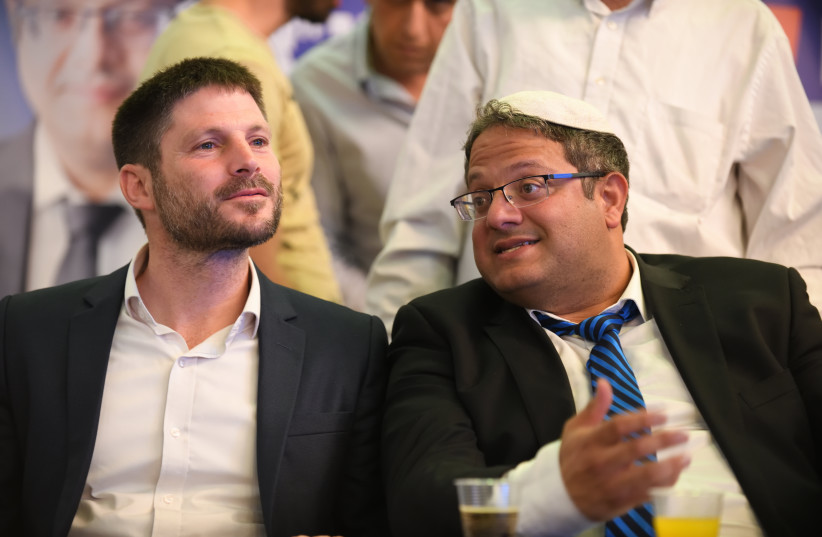Being this country’s defense minister is a very tall order, even in the easiest of times.
The job entails making life-or-death decisions affecting the fate of millions, managing a massive bureaucracy and being in charge of the ministry with the country’s largest budget.
And, again, all during easy times.
But with Iran on the verge of nuclear weapons, with the so-called “war-between-the-wars” continuing unabated in Syria, and with the West Bank on the cusp of an explosion, we are certainly not in the midst of easy times. If all that was not enough of a challenge for the new defense minister, Yoav Gallant, he will now also have to deal with turf battles on a scale that no other defense minister before him has faced.
The government’s decision to take authority of the Border Police away from the Defense Ministry and give it to National Security Minister Itamar Ben-Gvir, and to appoint Finance Minister Bezalel Smotrich as a minister in the Defense Ministry with authority over the Civil Administration and the Coordinator of Government Activities in the Territories, will add additional challenges to the traditional ones that this country’s defense minister always faces. It’s akin to adding other items to a plate already spilling over.

That Gallant is very much cognizant of these new challenges was apparent Sunday, when after formally taking over at the Defense Ministry from his predecessor, Benny Gantz, he was quoted during his first meeting with the IDF’s top brass as saying that he “will not allow harm to the chain of command,” and that “each officer in the army has one commander: the chief of staff.”
This showed that already on his first day in office, Gallant felt the need to put to rest concerns about possible changes in the chain of command as a result of Smotrich and Ben-Gvir getting authority over areas that were once within the defense minister’s purview.
The hierarchical chain of command – essential in any well-functioning army – has always been a given here. But now, since Smotrich will appoint the generals leading COGAT and the Civil Administration, a question has arisen: To whom will these appointees answer, to the chief of staff or to Smotrich? This is not something that defense ministers had to deal with or worry about in the past.
Likewise, placing the authority of the Border Police in Judea and Samaria under Ben-Gvir’s control rather than under that of the chief of staff and the defense minister will create challenges for Gallant that his predecessors never faced.
For instance, there are reports that Ben-Gvir wants to move an entire Border Police division from the West Bank to the Negev to deal with crime and lawlessness there. But what if the chief of staff is opposed because he needs that manpower? Who has the final word?
Israel's defense minister still needs to deal with Iran, Palestinians
Issues such as these that will need Gallant’s attention add items to an already long list of regular staples that the defense minister has to deal with: first and foremost Iran.
Since Shaul Mofaz served as Ariel Sharon’s defense minister in 2002, every defense minister has had to prepare for the possibility of military action to thwart Iran’s nuclear program. Prime Minister Benjamin Netanyahu has said in various interviews with foreign outlets since the November 1 election that stopping Iran from acquiring nuclear weapons is the main reason he wanted to come back a third time. As a result, this will be a significant focus and preoccupation for Gallant.
He alluded to it in the transfer-of-power ceremony Sunday at the Defense Ministry in Tel Aviv, when he said Iran is “pushing hard toward a nuclear weapon alongside repeated declarations of its aspirations to destroy the State of Israel.”
Gallant will need to work closely with the US in dealing with Iran, just as Gantz did. It’s worth remembering that in the early days of the coalition negotiations, Smotrich was being discussed as a possible defense minister. The US made known its opposition to such a possibility by hinting that it would not deal with the far-right Smotrich.
Smotrich was awarded the Finance Ministry instead, with a tiny toehold in the Defense Ministry, enabling the vital relationship between the Defense Ministry and the Pentagon to continue unharmed. And this relationship is critical for Israel. Not only will Gallant be discussing Iran with the Americans, he will also be discussing joint projects and weapon development and procurement.
The defense minister is a crucial actor in US-Israel relations, and all signs suggest that the Americans will have no trouble – in fact, they prefer – dealing with Gallant over some of the other options that were being discussed in the early days of the coalition negotiations.
Then there is the Palestinian issue. Gallant is taking the reins of the Defense Ministry when the security situation in the West Bank remains volatile and tense. He will face the twin challenges of trying to keep a lid on Palestinian terrorism at a time, when there is jockeying for power among the Palestinian factions for the day when Palestinian Authority President Mahmoud Abbas leaves the scene; and keeping a lid on Jewish extremists in Judea and Samaria who may feel suddenly emboldened because of the composition of the present government.
Gallant’s first big test may come sooner than he thought if Ben-Gvir, as expected, visits the Temple Mount in the coming days. That visit encapsulates one of the key challenges Gallant will now face: dealing with the security consequences and fallout from actions that partners in his own coalition – primarily the Religious Zionist Party and Otzma Yehudit – will initiate.
